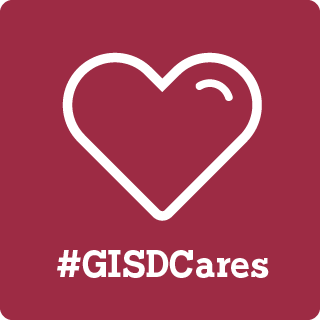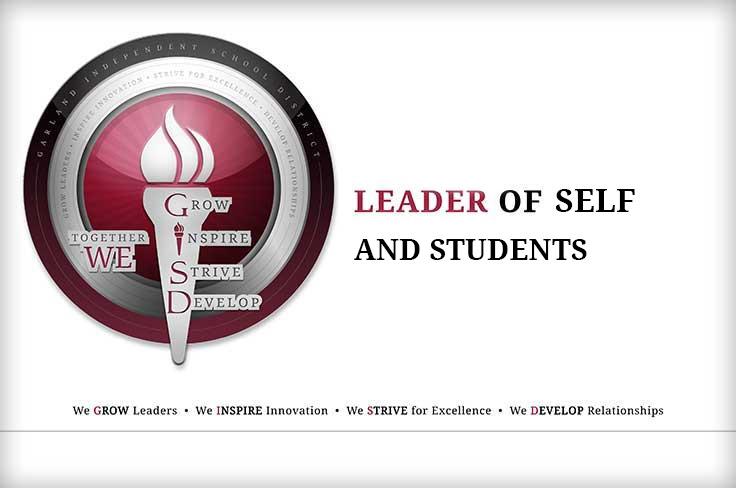


Campus Leader of Self and Students
See the role-specific behaviors for campus leaders of self and students.

What makes a great leader of self and students?
There are actions and attitudes that indicate leadership behavior for a particular role. These role-specific behaviors can be used to coach and evaluate employees. The indicators can also be used to assess skills needed to advance to the next level of leadership.
The role-specific behaviors for campus-related Leader of Self and Students are outlined below.
Related job roles: Aide, Bus Driver, Clerk, Cafeteria Worker, Librarian, Security Officer, Teacher
Need a hard copy? See the Leader of Self and Students: Campus Role-Specific Behaviors flyer (PDF).
We GROW Leaders
Foster Ownership
Takes responsibility for growth in self and others
- Holds self accountable to meeting individual goals and models this behavior for students
- Reflects on practice to identify and prioritize growth areas for students, peers and self
- Consistently takes pride in own work and believes that own actions and responsibilities are a critical lever for student and district success
- Operates with a sense of urgency, responsibility and purpose because of the significance of that impact
Pursue Continuous Growth
Seeks out and incorporates feedback into one’s practice; models being a learner and continuously seeks to grow & improve
- Actively seeks and effectively applies feedback from students, parents and team members
- Continuously reflects on own actions and behaviors, accurately identifies areas of strength and growth, and works to improve areas of growth
- Demonstrates a commitment to continuous learning and improvement through engagement in professional learning based on their needs
- Consistently displays a growth mindset and embraces failures as an opportunity to grow; models this behavior for students
Empower Others
Distributes leadership, giving people the opportunity to impact growth
- Creates opportunities for students to engage in leadership roles
- Actively identifies student leaders and invests time and effort into supporting their growth and development
- Cultivates an environment where students' strengths are recognized and highlighted; actively identifies leadership potential in all students, invests in their growth and development and supports growth in peers
We INSPIRE Innovation
Take Initiative
Anticipates and solves problems proactively, with resilience
- Models resiliency for the students, seeking opportunities to learn and grow from failure and challenges
- Takes initiative to act and solve problems to ensure outcomes are achieved
Seek Innovation and Change
Actively embraces new ideas and creative solutions; leads others through change
- Embraces new approaches to create better results for students
- Willing to try new ways of doing things, productively challenging the status quo
- Is comfortable with change and ambiguity and models an openness to change for students
- Adjusts leadership style to effectively respond to challenging circumstances
Celebrate Achievement
Recognizes and celebrates others for achievements; uses recognition to reinforce positive efforts
- Systematically and equitably recognizes and celebrates the accomplishments of students and colleagues
- Inspires students to accomplish their goals and provides individualized guidance and support in doing so
- Consistently celebrates and rewards students and colleagues who demonstrate exceptional effort and outcomes through specific praise and special touches
We STRIVE for Excellence
Focus on Student Success
Takes personal accountability for student outcomes and advancing student success
- Sets ambitious classroom-wide goals for student success
- Collects and analyzes multiple data systems to track students achievement and growth
- Takes ownership of student results and creates a plan for improvement
- Proactively and continuously improves performance in the classroom by focusing on needed areas of improvement
- Acts decisively; recognizes when a decision is needed and either takes action or elevates it appropriately
Project Positive Presence
Exhibits poise, confidence, loyalty and integrity in all interactions
- Consistently exhibits professionalism, honesty, integrity, fairness, stewardship, trust, respect and confidentiality and models this expectation for students
- Contributes to a culture of cohesion and assuming the best in others; demonstrates a genuine interest in what may be learned from others
- Resolves conflicts within the classroom in a constructive manner
- Models positivity and optimism when engaging with staff, students and families
- Is highly-responsive, visible and accessible to stakeholders
Live the Vision
Understands that “We are all Garland ISD” – every individual’s actions contribute to reaching the future by driving excellence, one student at a time
- Contributes to creating and implementing a school-wide vision
- Contributes to a culture of cohesion and assuming the best in others; demonstrates a genuine interest in what may be learned from others
- Resolves conflicts within the classroom in a constructive manner
- Models positivity and optimism when engaging with staff, students and families
- Is highly-responsive, visible and accessible to stakeholders
We DEVELOP Relationships
Embrace Diversity
Values and celebrates all cultures and communities; fosters an inclusive environment for all, honoring backgrounds and identities
- Creates an inclusive and equitable classroom environment for students of all backgrounds and advocates for their needs
- Forms collaborative relationships with others, including peers, parents, and community members
- Celebrates diversity and advocates for all students
- Reduces and eliminates bias; actively ensures that neither conscious nor unconscious biases negatively impact students
Communicate Effectively
Communicates clearly, proactively, and transparently with all stakeholders
- Actively listens to others and responds with an acknowledgement and respect of their perspective
- Is consistently accessible and responsive to all stakeholders through different forms of verbal and written communication
- Adapts communication style to meet needs of students, families and colleagues
Act with Compassion
Shows empathy and care for all stakeholders, upholding high expectations for self, students, and staff
- Aware and informed about the personal circumstances and needs of students and colleagues while maintaining professional standards
- Acknowledges significant events in the lives of students and colleagues with care, respect and compassion
- Demonstrates empathy for students and colleagues while upholding high expectations for all















